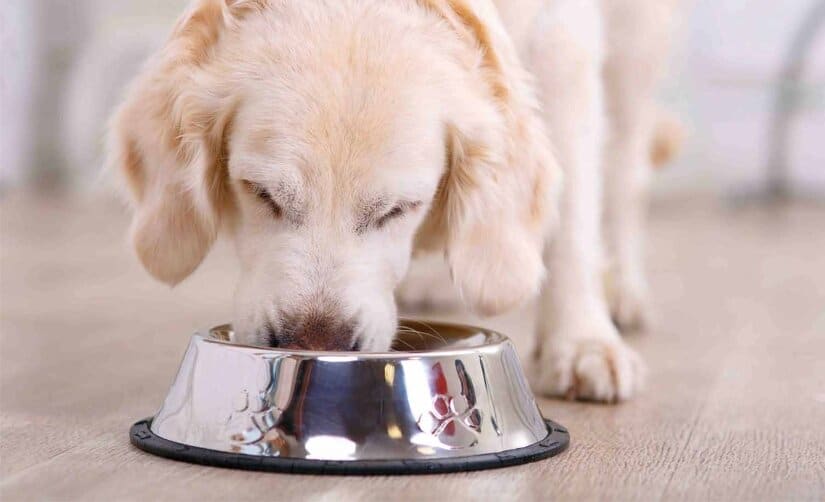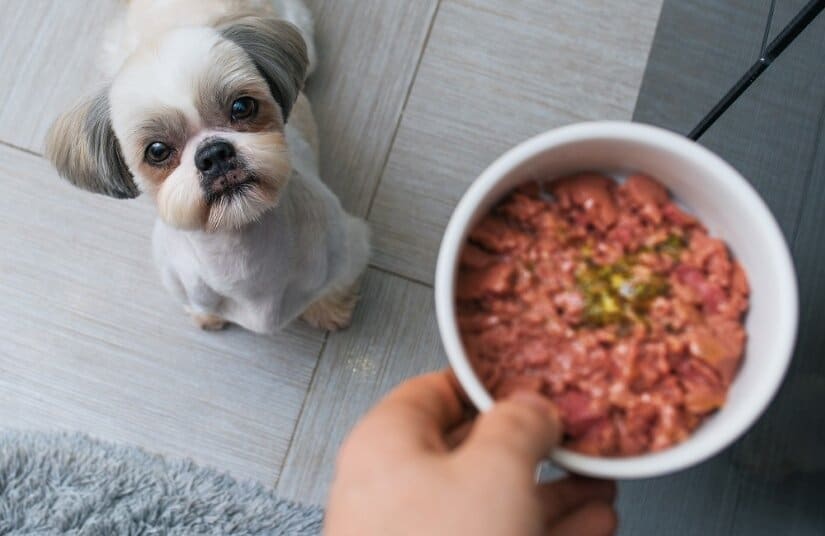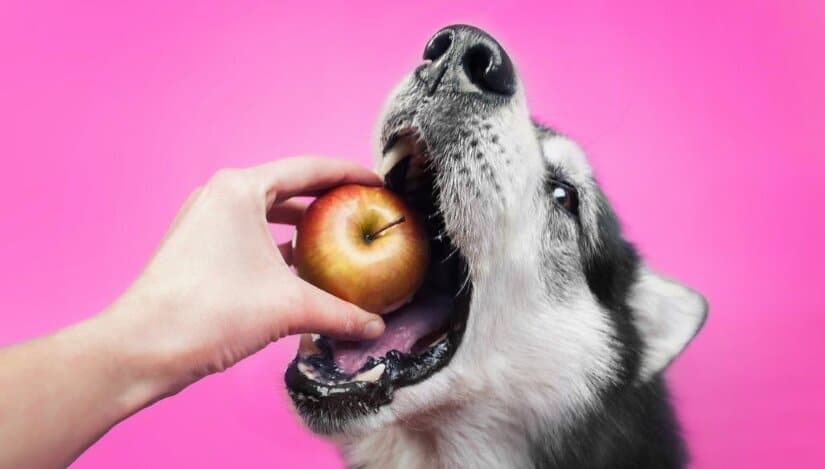Dog pet parents want to feed their dogs the best dog food formulas possible to ensure longevity, and to prevent obesity. We also want pups and dogs that are alert, focused, easy-to-train, and that have awesome temperaments. Feeding your dog for intelligence and optimal health means exploring the huge array of all dog foods today.
So how do you know which dog food formula to opt for? The kibble market today makes it difficult for pet parents to choose, most especially because of clever marketing techniques. Feeding your dog for intelligence and optimal health means feeding the right dog food formula, and also consulting with your veterinarian as to what will work for your dog.
Commercial kibble formulas need to be palatable and digestible, and of a nutritionally high-quality to keep all dogs at a healthy weight, and to all prevent obesity. Dog food also has to be formulated specifically for the correct life stage of the pup or adult dog.
Feeding your dog for intelligence and optimal health allows for the right balance of nutrients a dog needs at each stage of his life, and should be geared specifically for a dog’s lifestyle, whether he’s active or recuperating from an illness.
Dog food kibble formulas or homemade diets must contribute to brain health, and longevity for your dog. It must also definitely contribute to the overall well-being of dogs. The question is, what is the best dog food diet to feed your dog for intelligence and optimal health?
Good nutrition is key for both human and dog. Today, with differing opinions as to which dog food formula is best for optimal health it’s important that pet parents consult with their veterinarians first. It may be necessary to delve into as many dog food formulas as you can, to see which one is best for your doggo today. There will be pros and cons to each one. It’s best to do plenty of research, and to consult with your veterinarian before changing your dog’s diet.
The raw-food diet has elicited many opinions, both good and bad. Nutritional balance is critical, as is meticulous preparation, high-grade organic ingredients, cleanliness and organization. Studies have indicated that dogs that are fed a raw-food diet shed both Salmonella and E coli bacteria to a much higher degree than dogs on a cooked high-quality diet.
Feeding an unbalanced homemade diet most times can lead to dangerous complications, including osteodystrophy, osteopenia, nutritional secondary hyperthyroidism, and pancreatitis.
Meat sources are normally high in phosphorus, and can be minimal in calcium; if no calcium source is combined to the diet, the calcium concentration will not be enough, and the calcium/phosphorus ratio will be low as well.
Dogs that lack Vitamin D are especially prone to type 1 rickets, which is demonstrated by osteodystrophy. In a study comparing the nutritional value of homemade diets, it was demonstrated that sometimes calcium, the calcium phosphorus ratio, and vitamins A and E were below current recommendations for nutritional requirements. Potassium, copper, and zinc were also found to have been inadequate.
Vitamin D and calcium deficiency in young puppies and growing adolescent dogs is especially problematic. These growing puppies need a proper balance of calcium and phosphorus for bone growth.
There are certain ingredients that can be very high in a particular vitamin. This can cause a problem. An example of this is liver, which is high in vitamin A, and can result in vitamin toxicity in dogs that are fed a diet based on liver. Some homemade recipes necessitate the use of raw ingredients. These ingredients sometimes contain bacteria that can be destroyed by cooking.
Formulating an Organic Homemade Diet for Your Dog

You’ll need to begin making up an organic homemade diet by understanding what your pooch needs nutritionally each and every day. These requirements should be based on your dog’s activities, life-stage, and what your dogs’ special health requirements or needs are.
The Nutrient Research Council (NRC) frequently writes about the nutritional requirements of dogs, and these requirements should serve as a guideline.
The Association of American Feed Control Officials (AAFCO) also provides guidelines and nutrient profiles for pets
- Thoroughly research the guidelines for the desired levels of all ingredients.
- Opt for high-grade ingredients
- Make–up a balanced diet that contains the proper amounts of fats, protein, vitamins, and minerals.
Feeding Your Dog for Intelligence & Focus
We all want our dogs to be smart, and to pick up on training cues really fast. We want our dogs focused and obedient! What you feed your furry best friend has an influence on his behavior and his intelligence.
If you’ve ever had that lazy, tired, and irritable mood after a large meal, then you’ll have an idea as to how your doggo’s diet will affect his behavior. Scientists thinks that it’s possible to change the neurological and physical aspects of a dog’s brain through healthy nutrition. If your doggo is unruly or aggressive, consider changing his or her diet. Always consult with your veterinarian before switching diets.
Salmon for Brain Health

Tasty cold-water fishes are heavily rich in omega-3 fatty acids. These including salmon, tuna and sardines. Healthy fats prevent and combat canine cancer. Fish also keeps your dog’s coat healthy and soft. Fish oils act as an anti-inflammatory. Grilled salmon can be added to your dog’s kibble or added to brown vegetable steamed rice.
Organic Yogurt
Yogurt has been a staple in Eastern Europe and Asia since 2,000 BC. The goodness from the bacteria in yogurt helps your dog’s digestion. Yogurt also promotes the immune system. It helps fight against cancer and most infections. Feed your doggo plain, unflavored yogurt every morning, and add a few blueberries for taste. These will yield plenty of benefits.
Organic Chickpeas
Chickpeas are popular today. They are nutritious and have soluble fibers that help maintain healthy blood sugar levels. Chickpeas keep your dog’s arteries and heart healthy. They also promote digestion. Adding chickpeas to his or her diet has been proven beneficial in the fight against canine cancer. They contain antioxidants.
You’ll first have to wash away all excess salt before adding chickpeas to your dog’s diet, if canned. Most dogs enjoy these. Organic chickpeas are great when used as a topping to steamed brown vegetable rice with grilled organic salmon or chicken strips.
Organic Eggs
Organic eggs are a good source of protein for dogs. Although some dogs may even refuse to consume eggs, they can be blended with other meals. All other proteins do not match up to eggs since eggs contain plenty of all things good. B2, B12, K, biotin and vitamins all can be found inside an egg. Purchase organic, omega-three enriched eggs and feed your dog eggs a few times a week. Dogs digest this protein easily and efficiently. Eggs contain only 90 calories.
Quinoa

This is one of nature’s perfect grain, and is loaded with plenty of nutritious protein. It contains all ten essential amino acids. This grain contains increased levels of iron, dietary fiber, manganese, copper, phosphorous and is a great way to add delicious variety to your dog’s meal.
Dogs enjoy healthy treats like carrots. Carrots contain more alpha-carotene than other fruits and vegetables. It also promotes eye, heart and lung health, and is high in vitamins B6, C and K, potassium, niacin and folate. These can be used during training as treats. Older puppies love to teeth on cold carrots. It helps ease the pain during teething.
Fresh Foods and Enzymes
Fresh organic foods are sometimes forgotten in canine diets, although fresh fruits and vegetables are necessary. A diet that is high in fresh, organic raw fruits and vegetables is key to providing optimal health for your dog.
There are over 1,300 different enzymes found in dogs, each with a different function, such as digesting food or processing different waste materials in the blood. Enzymes are essential to life. All raw food has enzymes, which are made by living organisms.
Enzymes are only found in raw food. This is because they are destroyed in food that is heated over 105 degrees Fahrenheit. (40.56°C) Any food that is heat processed, roasted, fried, or baked does not contain enzymes. This is why it’s necessary to feed your dog a diet containing some raw and fresh fruits and vegetables.
There will also be some doggos that suffer from a digestive enzyme deficiency. Although the body makes many enzymes, it is very important to get enzymes from fresh, raw foods. Unfortunately, there are still some dogs that only get fresh foods from the grass outside in their garden. Digestive enzymes help to break down food, enabling all the nutrients to get absorbed.
Dogs start off life with plenty of digestive enzymes, which tend to become depleted if they are never given fresh, raw foods. Ask your veterinarian to check your doggo’s diet. Some larger breeds exhibit tendencies to being more prone to digestive enzyme deficiencies. This can cause intestinal problems, including digestive problems, and the inability to absorb nutrients from foods.
These nutrient deficiencies cause many chronic problems, including skin issues, allergies, diarrhea, and frequent vomiting in dogs. Adding fresh, raw foods to a dog’s meal or as a snack or treat would be all that’s needed to help with digesting and absorbing food. It’s important to include a digestive enzyme supplement, formulated for pets. If your dog suffers from digestive stress, he’ll exhibit these symptoms:
- Weight Loss
- Lethargy
- Lots of Shedding
- Poop eating
- Vomiting
Superfood for Dogs: Spirulina

What super food could be better than spirulina for your dogs? Spirulina offers vitamins, minerals, protein, and antioxidants, and is easy for all dogs to digest. It’s a good source of concentrated chlorophyll, more so than any other food.
- Spirulina is also key to preventative health for your dog. It’s not only easy to digest and absorb, but is a great form of protein. Beef is only roughly 20 percent digestible, spirulina is digestible at 85 %. This amazing antioxidant will nurture, tone, and cleanse. With its blue-green algae color, this single-celled antioxidant helps with digestion and nutrient absorption. your Chow’s body, and aid in recovery if he’s ill. Spirulina also protects your dog’s kidneys from the damaging effects of antibiotics.
- You can add spirulina by ordering the sprinkles kind, and sprinkling on your dog’s meals. This will boost his immune system and enhance his well- being and energy levels. It is also rich in essential oils and will improve your dog’s skin and coat.
Processed High-Quality Dog Food
Processed high-quality dog foods often have many preservatives added that will enhance product shelf life. Fresh foods and homemade dog food diets that have been prepared at home will not have been processed or have unhealthy preservatives added.
Commercial raw diets are shipped frozen, and already have preservatives. This diet benefits dental hygiene, since dogs do a lot of chewing. Talk to an expert before switching dog food formulas.
Raw Food Diets
Raw dog food diets, most especially the home-made diets may help to meet your dog’s specific nutritional needs, but only with veterinary guidance. These diets need to be approved by your veterinarian first. Keep in mind that these take a lot of preparation, and should be made up in bulk and frozen for the week.
Raw diets can be prepared healthily, and allow dog parents to avoid ingredients that their dogs may be allergic to. It can also be made to meet your dog’s specific nutrient requirements as per veterinary guidelines.
Never feed this diet without first consulting a veterinary nutritionist. Another advantage is the high water content present in the raw food diet. This allows you to feed more food while still keeping count of the calories.
Grain-Free Dog Foods

Today’s dry dog food recipes offer grain-free lines for pet parents. These are growing in popularity. Fresh meats with low glycemic ingredients like chickpeas and lentils aid in preventing allergies. Coconut oil, organic apple cider vinegar and turmeric are also added ingredients in dry dog food brands that help aid digestion and boost the immune system. Dry dog foods today are available in exciting new recipes with duck, salmon, venison, buffalo and Alaska Pollock.
Pet parents are looking for solution-based nutrition to help with specific problems in their dogs. Companies like Petcurean are a great example in that they don’t have a one-for-all philosophy for dog food. All their recipes focus specifically on pets that are fussy eaters, may need a grain-free diet or perhaps a higher protein diet.
When opting for a balanced dog food formula, it’s necessary to make sure that the dog food whether it’s kibble or a specific diet is tasty and that your dog will, eat it. If your pooch is overweight, you’ll need to check to make sure that the formula is part of a calorically- balanced diet. Go for a dog food that is made for your dog’s lifestage.
Older dogs that don’t get to be as active or are overweight should be on a dog food formula for older dogs. Part of the dry dog food diets can also be replaced with wet canned food that are grain-free and contain duck, salmon, venison, pheasant, whitefish, beef, chicken, rabbit, buffalo, and even duck.
When trying to cut down on calories with overweight dogs, you can do so without leaving your dog feeling hungry. Weight management diets should be supervised by a veterinarian so that portion control means the right amount, and to also make sure that the correct amount of kibble is fed. That said, by preventing obesity in all our furry best friends makes for a fun, and more focused lifestyle.
